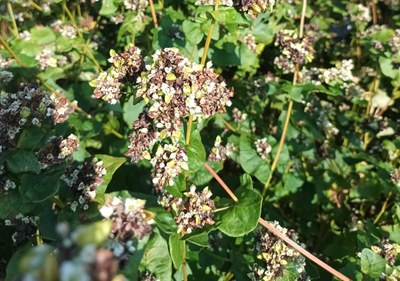
Duration
December 2024 to November 2028
Contact

Dr. Anika Wiese-Klinkenberg
Senior Scientist
Building 06.5 / Room 2004a
+49 2461/61-8688
E-MailBIMOTEC
Buckwheat Improvement by Modern Technologies for the Establishment of a Dual-Use Crop
BIMOTEC aims to strengthen buckwheat cultivation in Germany by breeding local varieties that can be planted as second crop in a double crop system to increase agrobiodiversity and climate-resilience and thus stabilize farmers’ yields. Buckwheat is an underutilized crop that is increasingly valued as a healthy, gluten-free pseudo-cereal. Buckwheat grains and residual biomass contain large quantities of industrially valuable secondary metabolites. These phytochemicals have various health-beneficial properties and can be used in the food and pharmaceutical industries. BIMOTEC is focusing on establishment of buckwheat as dual-use crop to leverage both buckwheat grains for food production and residual biomass for the extraction of biobased compounds. Breeding of dual-use plants offers great potential to establish innovative bio-based value chains. To develop climate-resistant local buckwheat varieties, BIMOTEC employs phenotyping, transcriptomics and metabolomics to analyze relevant traits in greenhouse and field experiments. These studies investigate the genotypic variation in buckwheat’s responses to drought and cultivation on marginal soils, aiming to identify favorable phenotypic traits, valuable secondary metabolites and their genetic markers. Field trials and on-farm cultivation of buckwheat play an important role in BIMOTEC aiming to quantify grain yield and quality. Additionally, process-oriented agronomic models are being validated to optimize cultivation practices. Genome editing technologies are being developed to establish and improve agronomically important traits, laying the foundation for future modern breeding initiatives.
Contacts:
Dr. Anika Wiese-Klinkenberg, IBG-4
Dr. Laura Junker-Frohn (Coordinator) /Dr. Kerstin Nagel, IBG-2

